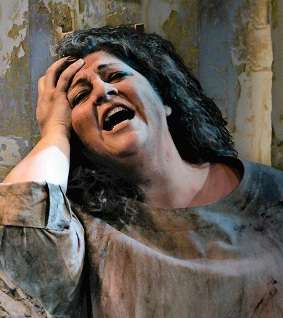|
Back
Christine Goerke, a Great Elektra Chicago
Lyric Opera
10/06/2012 - & October 10, 13, 19, 22, 26*, 30, 2012
Richard Strauss: Elektra, opus 58
Christine Goerke (Elektra), Emily Magee (Chrysothemis), Jill Grove (Klytämnestra), Alan Held (Orest), Roger Honeywell (Aegisth)
The Lyric Opera Orchestra and Chorus, Martin Wright (Chorus master), Sir Andrew Davis (Conductor)
Sir David McVicar (Director), John Macfarlane (Sets and Costumes), Jennifer Tipton (lighting)

C. Goerke (© Dan Rest/L.O.)
The new production of Richard Strauss’ Elektra mounted by the Lyric Opera of Chicago is superb. Set outside the dead Agamemnon’s palace, where his wife Klytämnestra tumbles in bed with Aegisth, who murdered her husband, the interior of blood, lust and lights is suggested by shimmering red light. Outside the world is in ruins, granite grey, its rocks and bricks broken. Shapes of a prison, a world whose hope lies in a buried axe, and a theatron, the Greek amphitheater whose title means a seeing place, are all suggested.
Director McVicar perfectly directs this brutal and uncompromising opera. Lighting designer Tipton casts shadows against the tall walls: preshadows of Aegisth and Agamemnon, clearer in his four note lied motif sharply sent out in the first notes of the orchestra, and foreshadows of Orest, the sibling charged with avenging his father’s murder.
The maids await the arrival of Elektra for an early nocturnal ritual: the groans of anguish as she remembers her father, her hatred for her feckless mother and murdering stepfather.
The moment the great Christine Goerke arrives on stage, swathed in grey, her hands fluttering in hate, we are fixed on this superb soprano. She is consumed by ideas of vengeance. Amidst the blazing lanterns her searing high notes scream. Yet she is always human.
Goerke has a wide vocal range, her voice full and rich. In absolute control of the vocal dynamics of her role, she manages her acting performance in comfortable congruence with the voice. Elektra may seem mad, but truly it is hate and the desire for vengeance that drive her. Can she manage murder if her long-awaited brother does not arrive?
Goerke says that she cannot let her voice run as wild as her emotions, or she will not make it through the performance. “You use the emotions and color the vocal line and the scene.” Yet nothing seems withheld as she performs.
Heralded in Houston, where she sang Elektra’s sister Chrysothemis, Goerke’s debut as Elektra caused a sensation in Madrid. Audiences are swept by her huge voice delivered without any seeming effort. Her contrasting legato passages are full of passion and lovely. Goerke’s Lyric debut will be long remembered in the hearts and minds of operagoers.
As her sister Chrysothemis, Emily Magee sings a nice foil, and delivers particularly beautiful lines about her wish to return to normal, to marry and to bear children.
The arrival of Klytamnestra, sung with commensurate drama and tone by Jill Grove, is perfectly set between her nightly dreams of destruction, which erupt in consuming fear, and her wish to derail her daughter. Bare-topped with a shield of dangling baubles, Klytamnestra reminds us of Max Reinhardt’s original mounting of Hofmannsthal’s play Elektra described as a circus piece. Strauss’ music confirms the tinsel and glitter of Klytamnestra mixed with hollowness and decay.
Program notes suggest members of Klytamnestra’s court are inspired by North African tribal rituals, but they impress as a freak show. With Goerke dominating as an Elektra huge in her passions, pushing out the court in bizarre dress and gesture is an inspired contrasting touch.
Alan Held is a great singing actor. As Orest in disguise, he arrives accompanied by the opera’s most beautiful music. Understandably Elektra does not recognize him. He also does not know who he is addressing, because his sister has moved so far from her princessly beauty. Their recognition moment is exceptionally touching, even as it embraces an attempt at vengeance.
Particularly striking throughout is the dance movement of the main characters accompanied with hand gestures. Splayed hands, traditionally used as rejection gestures, a human modesty guard and a grab gesture, emphasize tortured vocal lines and graphically detail the internal chaos of the characters.
As Elektra whirls into oblivion at the opera’s end, the audience, too, finds catharsis in blood and vengeance. Sir Andrew Davis concludes a stunning orchestral performance with the finale announced as the ghost of Agamemnon’s theme rises in octave passages, followed by Orestes theme blared out on trumpets. Agamemnon’s theme returns again and again. Elektra falls lifeless as the chord accompanies her fall and dies away. Mission accomplished. ‘Orest lives’ is the magnificent conclusion. The outcome announcing: A living thing! So too this production lives.
Susan Hall
|